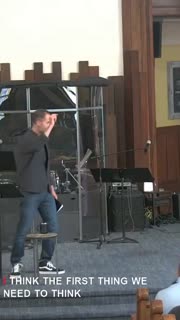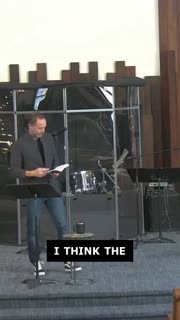Embracing Surrender: Lessons from King Josiah
Devotional
Sermon Summary
Bible Study Guide
Sermon Clips
### Quotes for Outreach
1. "I just want to, you know, looking back, you know, seven full years and just seeing what God has done in this place, how he has really resurrected it. I remember in that first year as God started to do some growth and change. I remember. I remember part of that early group, people just like weeping in the aisles as God brought life to this place." [30:16] (23 seconds)
2. "I think the first thing we need to think about this morning is this posture of surrender. Practically, I would invite you to do a couple things. One, you know, you saw my little silly doodle drawing. I'm sure that all of you have at least that artistic potential. But think about what are the parts of you in your life of discipleship right now? What are those parts? Maybe identify five or six of them and just get a sense of, are they actually submitted to the will of the Lord in your life?" [01:14:52] (34 seconds)
3. "I think one of the things that I just realized about this for myself is that there's a part of me that thinks that growth, oh, I need to go back to white, right? So you have time and you have growth. Part of me thinks it should be like this. Over time, my growth should just be linear up and to the right. The truth is growth doesn't tend to work most of the time like this. Growth tends to work more like plateaus, dips, and leaps." [01:01:03] (38 seconds)
4. "I think we believe a lot in God. I think we believe a lot in God. I think we think that, yeah, when you were 13 at that rally and you committed yourself to God, that's all you ever had to do. Often what it is, it's a re-turning back to God over time, often at a plateau and a dip. And I guess I just wonder for you today, where are you at in that process?" [01:01:03] (23 seconds)
5. "I think the second thing, though, is that we need to be able to stop doing peace. And you can't rush here, but I do think we really need to identify the idols that shape our imagination. And again, this isn't little wooden things that you have stored in your closet that maybe you're like, I don't know, whatever. You get the idea. The thing is, there are broken parts of us that adopt extreme positions because we're afraid. And this often becomes idols that we hold on to, right?" [01:16:36] (33 seconds)
### Quotes for Members
1. "Josiah's response, his personal response, does not change the consequences for the nation. How many times, at least for me, do I think, I just need to do this, and then all the consequences are going to go away? Also, there's a promise built in here from Huldah, hey, Josiah, don't worry, because of your faithfulness, you won't go into exile. I think there's a part of me that was like, if I heard that from God, I'd be like, phew, I can kick back now." [55:17] (32 seconds)
2. "Josiah begins by helping the people cultivate a posture of surrender. He then focuses on stop doing things, right? This is about idolatry, the previous commitments that orient our heart. And then he invites the people to form rhythms of faithfulness. Surrender, stop doing stuff, new stuff. See, Josiah has just learned from the Exodus and from Deuteronomy, there are all these patterns or rhythms of faithfulness and worship in Israel." [01:06:03] (46 seconds)
3. "I think what Josiah does is say, hey guys, first step, let's re-center ourselves in the loving, the steadfast love of God in his covenant promises to us. I think one of the things that I just realized about this for myself is that there's a part of me that thinks that growth, oh, I need to go back to white, right? So you have time and you have growth. Part of me thinks it should be like this. Over time, my growth should just be linear up and to the right." [01:01:03] (48 seconds)
4. "I think we believe a lot in God. I think we believe a lot in God. I think we think that, yeah, when you were 13 at that rally and you committed yourself to God, that's all you ever had to do. Often what it is, it's a re-turning back to God over time, often at a plateau and a dip. And I guess I just wonder for you today, where are you at in that process? Have you kind of just plateaued? Are you just kind of doing the same thing you've done for however long?" [01:01:03] (31 seconds)
5. "I think the second thing, though, is that we need to be able to stop doing peace. And you can't rush here, but I do think we really need to identify the idols that shape our imagination. And again, this isn't little wooden things that you have stored in your closet that maybe you're like, I don't know, whatever. You get the idea. The thing is, there are broken parts of us that adopt extreme positions because we're afraid. And this often becomes idols that we hold on to, right?" [01:16:36] (33 seconds)
Ask a question about this sermon
1. "I just want to, you know, looking back, you know, seven full years and just seeing what God has done in this place, how he has really resurrected it. I remember in that first year as God started to do some growth and change. I remember. I remember part of that early group, people just like weeping in the aisles as God brought life to this place." [30:16] (23 seconds)
2. "I think the first thing we need to think about this morning is this posture of surrender. Practically, I would invite you to do a couple things. One, you know, you saw my little silly doodle drawing. I'm sure that all of you have at least that artistic potential. But think about what are the parts of you in your life of discipleship right now? What are those parts? Maybe identify five or six of them and just get a sense of, are they actually submitted to the will of the Lord in your life?" [01:14:52] (34 seconds)
3. "I think one of the things that I just realized about this for myself is that there's a part of me that thinks that growth, oh, I need to go back to white, right? So you have time and you have growth. Part of me thinks it should be like this. Over time, my growth should just be linear up and to the right. The truth is growth doesn't tend to work most of the time like this. Growth tends to work more like plateaus, dips, and leaps." [01:01:03] (38 seconds)
4. "I think we believe a lot in God. I think we believe a lot in God. I think we think that, yeah, when you were 13 at that rally and you committed yourself to God, that's all you ever had to do. Often what it is, it's a re-turning back to God over time, often at a plateau and a dip. And I guess I just wonder for you today, where are you at in that process?" [01:01:03] (23 seconds)
5. "I think the second thing, though, is that we need to be able to stop doing peace. And you can't rush here, but I do think we really need to identify the idols that shape our imagination. And again, this isn't little wooden things that you have stored in your closet that maybe you're like, I don't know, whatever. You get the idea. The thing is, there are broken parts of us that adopt extreme positions because we're afraid. And this often becomes idols that we hold on to, right?" [01:16:36] (33 seconds)
### Quotes for Members
1. "Josiah's response, his personal response, does not change the consequences for the nation. How many times, at least for me, do I think, I just need to do this, and then all the consequences are going to go away? Also, there's a promise built in here from Huldah, hey, Josiah, don't worry, because of your faithfulness, you won't go into exile. I think there's a part of me that was like, if I heard that from God, I'd be like, phew, I can kick back now." [55:17] (32 seconds)
2. "Josiah begins by helping the people cultivate a posture of surrender. He then focuses on stop doing things, right? This is about idolatry, the previous commitments that orient our heart. And then he invites the people to form rhythms of faithfulness. Surrender, stop doing stuff, new stuff. See, Josiah has just learned from the Exodus and from Deuteronomy, there are all these patterns or rhythms of faithfulness and worship in Israel." [01:06:03] (46 seconds)
3. "I think what Josiah does is say, hey guys, first step, let's re-center ourselves in the loving, the steadfast love of God in his covenant promises to us. I think one of the things that I just realized about this for myself is that there's a part of me that thinks that growth, oh, I need to go back to white, right? So you have time and you have growth. Part of me thinks it should be like this. Over time, my growth should just be linear up and to the right." [01:01:03] (48 seconds)
4. "I think we believe a lot in God. I think we believe a lot in God. I think we think that, yeah, when you were 13 at that rally and you committed yourself to God, that's all you ever had to do. Often what it is, it's a re-turning back to God over time, often at a plateau and a dip. And I guess I just wonder for you today, where are you at in that process? Have you kind of just plateaued? Are you just kind of doing the same thing you've done for however long?" [01:01:03] (31 seconds)
5. "I think the second thing, though, is that we need to be able to stop doing peace. And you can't rush here, but I do think we really need to identify the idols that shape our imagination. And again, this isn't little wooden things that you have stored in your closet that maybe you're like, I don't know, whatever. You get the idea. The thing is, there are broken parts of us that adopt extreme positions because we're afraid. And this often becomes idols that we hold on to, right?" [01:16:36] (33 seconds)










